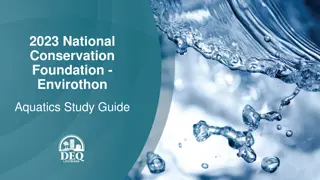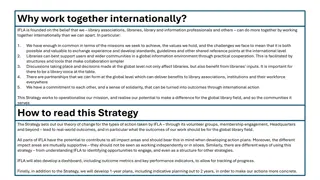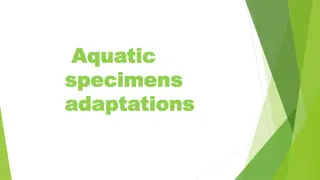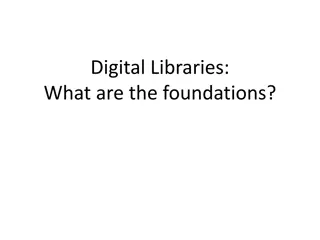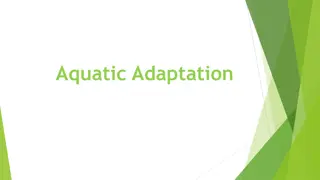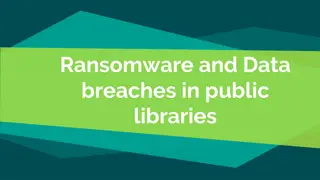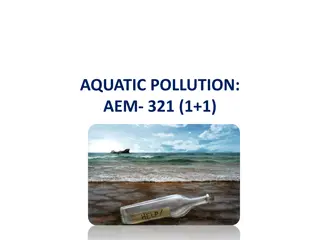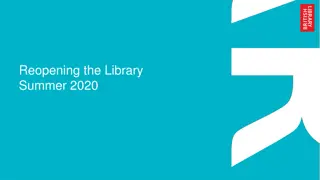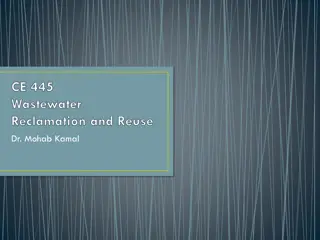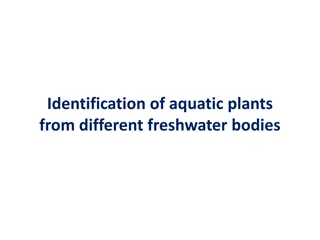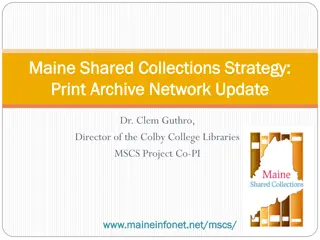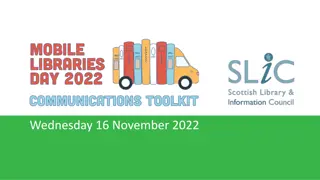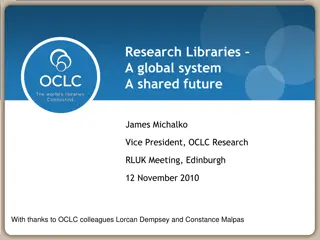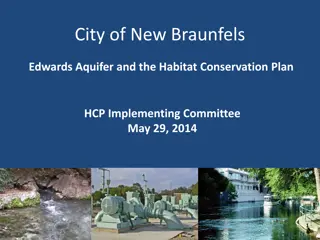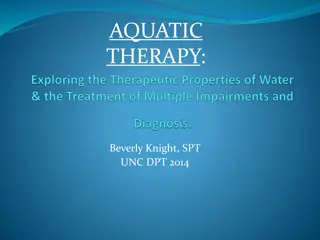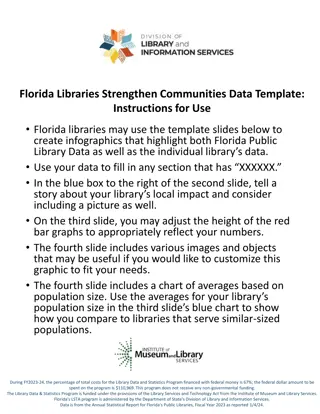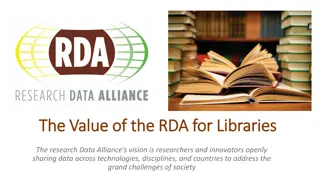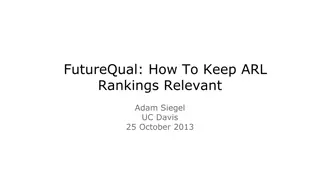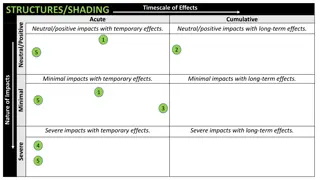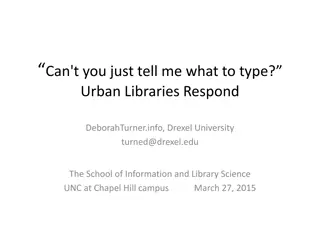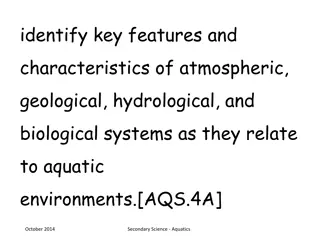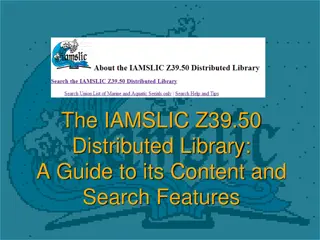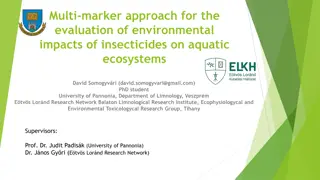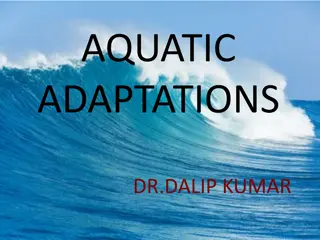Libraries, Sustainability, and the UN Sustainable Development Goals
Sustainability in libraries plays a crucial role in promoting inclusive development for current and future generations. Access to information is highlighted as a human right essential for decision-making in favor of sustainability. Meaningful access to information requires connectivity, equality, sk
4 views • 47 slides
2023 National Conservation Foundation - Envirothon
Explore the intricate dynamics of aquatic ecosystems and wetlands conservation through this comprehensive study guide. Discover the importance of watersheds, the hydrologic cycle, aquatic food webs, energy flow at trophic levels, and common macroinvertebrates in Louisiana. Learn about different wetl
3 views • 27 slides
Working Together Internationally: IFLA's Vision for Global Library Engagement
IFLA emphasizes the value of international collaboration among library associations, libraries, and information professionals to exchange experiences, develop standards, and address common challenges. By working together, libraries can enhance user support, foster global information access, and advo
1 views • 6 slides
Adaptations of Aquatic Specimens, with a Focus on Sea Snakes
Aquatic specimens, particularly sea snakes of the subfamily Hydrophiinae, exhibit fascinating adaptations for their fully aquatic lifestyle. These marine snakes are uniquely adapted for life in the sea, with specialized features such as paddle-like tails, compressed bodies, and the ability to respir
0 views • 16 slides
Overview of Digital Libraries and Their Foundations
Digital libraries are networked collections of digital objects that enhance knowledge building processes by addressing information overload, communication barriers, and research inefficiencies. Solutions include innovative technologies like mini-cameras, OCR, and natural language processing. Various
1 views • 26 slides
Empowering Entrepreneurs: Libraries as Catalysts for Business Growth
Libraries play a vital role in supporting entrepreneurs by providing access to resources, knowledge, technology, and networking opportunities. They break down economic barriers, offer free services, and empower underserved populations like women and BIPOC entrepreneurs. From skills development to ex
1 views • 9 slides
Colorado Alliance of Research Libraries: MARC Record Matching System Overview
Designed and hosted by the Colorado Alliance of Research Libraries, the Gold Rush Analytics Technical Overview showcases a cost-effective system utilizing open-source software with tailored solutions. The Matching MARC section details the methodology for matching records, emphasizing the pre-built m
1 views • 10 slides
Understanding Aquatic Adaptation in Animals
Aquatic adaptation refers to the changes in an animal's body organization to thrive in a water habitat. Vertebrates have evolved to lead partial or total aquatic lives, showcasing various adaptations. Water as a habitat offers a homogenous medium, stable conditions, and rich food resources. Aquatic
0 views • 9 slides
Ransomware and Data Breaches in Public Libraries Analysis
Delve into the world of ransomware and data breaches in public libraries, exploring the definitions of ransomware and data breaches, the potential impacts on libraries, the financial losses incurred, and the value of library records. Understand the risks, implications, and consequences associated wi
0 views • 21 slides
Integrating DPDK/SPDK with Storage Applications for Improved Performance
This presentation discusses the challenges faced by legacy storage applications and proposes solutions through the integration of DPDK/SPDK libraries. Topics covered include the current state of legacy applications, issues such as heavy system calls and memory allocations, possible solutions like lo
2 views • 17 slides
Understanding Aquatic Pollution and Its Impact on Water Quality
Aquatic pollution is a significant concern affecting the environment and human health. It includes various pollutants entering water bodies from land-based activities, causing harm to aquatic life and humans. Pollution sources can be classified into point source and non-point source. Monitoring wate
2 views • 13 slides
Initiatives for Public Libraries in England (2016-2021)
Explore the roadmap set by the Libraries Taskforce in England for advancing public libraries from 2016 to 2021. Discover the aims, strategies, and support provided for enriching library services. Delve into the executive summary, context, targeted services, and more.
0 views • 28 slides
United for Libraries: Empowering Library Trustees and Friends
United for Libraries is a division of the American Library Association that supports library trustees, advocates, friends, and foundations in governing, promoting, advocating, and fundraising for libraries. Through training, advocacy resources, networking opportunities, and consulting, United for Li
0 views • 28 slides
Reopening Strategies for Libraries in Summer 2020
Crafting a targeted and flexible communication approach is key to reopening libraries successfully in the summer of 2020. With a focus on engaging existing readers and emphasizing the value of users, libraries aim to provide access to collections while ensuring safety and patience during the process
0 views • 12 slides
Aquatic Treatment Systems for Wastewater Reclamation and Reuse
In aquatic systems, wastewater treatment involves bacterial metabolism and sedimentation, with aquatic plants playing a role in improving treatment capabilities. This article discusses the functions of aquatic plants in treatment systems and the categories of wetlands used for wastewater treatment,
1 views • 15 slides
The Impact of Streaming Video on Academic Libraries
Streaming video services have become increasingly popular in academic libraries due to the rising demand for convenient access to educational content. The complex licensing processes and varying pricing models pose challenges for libraries in managing their streaming video collections effectively. T
0 views • 31 slides
Collective Collections Analysis of Print Monographic Titles in Ivy Plus Libraries
The Ivy Plus Libraries are embarking on a project to collect, normalize, and analyze bibliographic and holdings records of single-part print monographs added to their catalogs between 2013-2017. The Task Force aims to enhance collaboration, streamline acquisitions, develop purchasing programs, and o
1 views • 6 slides
Greek Libraries: Past, Present, and Challenges Ahead
Greek libraries have a rich history dating back to ancient times. Today, they face challenges such as limited budgets, staffing issues, and changing administrative models. Despite these obstacles, libraries in Greece offer a variety of services like reading rooms, book lending, events, and education
0 views • 12 slides
Building Voter Support for Libraries - EveryLibrary's Mission
EveryLibrary, led by Executive Director John Chrastka, aims to build voter support for libraries through advocacy, campaign assistance, and data-driven strategies. They work to shape civic attitudes, influence voter perceptions, and secure funding for public libraries across the nation.
0 views • 40 slides
PALNI/ALI Project Overview: Indiana Academic Libraries Collaboration
The PALNI/ALI project involves collaboration among academic libraries in Indiana to implement Sustainable Collection Services (SCS) and GreenGlass, funded by Lilly Endowment Inc. The project aims to reduce print collections, reclaim space, preserve unique items, influence collection development, and
0 views • 15 slides
Understanding Thermal Pollution and Its Sources
Thermal pollution is the detrimental effect of heated effluents discharged by power plants on aquatic and terrestrial ecosystems. This pollution occurs when the temperature of water bodies rises significantly due to human activities, leading to a reduction in dissolved oxygen and impacting aquatic l
0 views • 19 slides
Identification of Aquatic Plants in Freshwater Bodies Based on Habitat Classification
Before identifying aquatic plants in freshwater bodies, it's vital to classify them into floating macrophytes, marginal macrophytes, submerged macrophytes, and emergent macrophytes. This classification aids in distinguishing various plant species such as Eichhornia, Salvinia, Pistia, Lemna, and Azol
0 views • 9 slides
Library Collaboration in Maine: A Shared Collections Strategy
Library collaboration in Maine involves academic, public, and special libraries working together through the Maine Shared Collections Strategy (MSCS) project. Led by Dr. Clem Guthro of Colby College Libraries, the project aims to manage legacy print collections efficiently across various institution
0 views • 18 slides
Celebrating Mobile Libraries Day 2022 in Scotland
Mobile Libraries Day 2022 is set to be celebrated on Wednesday, 16th November, coinciding with Book Week Scotland. The day highlights the vital role mobile libraries play in combating social isolation and serving diverse communities in Scotland. With 49 mobile libraries in 22 local authority areas,
0 views • 19 slides
Exploring the Future of Research Libraries in a Global System
A discussion held during the RLUK Meeting in Edinburgh in November 2010, led by James Michalko, Vice President of OCLC Research, about the evolving role of research libraries in the digital age. The presentation highlights the impact of the network on libraries, reconfiguring industries, the changin
0 views • 24 slides
Conservation Plan for Aquatic Habitat Restoration in New Braunfels
This plan outlines various projects aimed at managing aquatic habitats in New Braunfels for the restoration and preservation of native species such as the fountain darter. It includes objectives like flow manipulation, non-native vegetation control, and restoration of aquatic vegetation in the Comal
0 views • 17 slides
Exploring Aquatic Therapy: Benefits, Techniques, and Research Findings
Aquatic therapy, presented by Beverly Knight, SPT, offers a unique approach to rehabilitation with properties of water like buoyancy and resistance. This therapy can benefit patients with various conditions such as chronic pain, arthritis, and neurological impairments. The content covers indications
0 views • 22 slides
California Public Libraries Survey 2020-2021 Overview
The California Public Libraries Survey for 2020-2021 provides an in-depth look at the state of libraries in California. This webinar covers the survey process, data elements, resources, and the importance of the survey in understanding and meeting community needs. Learn about the National Public Lib
0 views • 25 slides
Florida Libraries Strengthen Communities with Data
Florida libraries are enhancing communities through data-driven initiatives, showcasing the impact of public library services. Utilize the provided template to create infographics highlighting the data from Florida libraries and individual library statistics. Explore the local impact of libraries, s
0 views • 4 slides
Enhancing Libraries' Role Through RDA Engagement
Explore how libraries can benefit from engaging with the Research Data Alliance (RDA), including opportunities to interact with data professionals, researchers, and academics, enhance expertise, and contribute to global data interoperability solutions. Discover the value of RDA for libraries and inf
0 views • 10 slides
Strategies for Keeping ARL Rankings Relevant in Research Libraries
Amidst reports of Penn State University Libraries ranking among the top ten North American research libraries based on ARL's Library Investment Index Rankings, this presentation by Adam Siegel from UC Davis highlights key strategies to ensure continued relevance and success in ARL rankings. The impo
0 views • 17 slides
Marine Aquaculture Impacts on Submersed Aquatic Vegetation
The document explores the impacts of structures and shading used in commercial shellfish mariculture activities on submersed aquatic vegetation, particularly seagrasses. It discusses the varying effects of mariculture structures on eelgrass density, productivity, and the potential habitat they provi
0 views • 11 slides
Understanding Food Webs in Aquatic Habitats
Exploring the intricate relationships within aquatic food webs, this content delves into the control of beneficial and pest species, highlighting the importance of biodiversity and the factors that influence species presence and success. From the role of frogs in the ecosystem to the impact on tadpo
1 views • 6 slides
Understanding the Importance of Oral Communication in Modern Libraries
Deborah Turner from Drexel University presented research on the impact of oral communication in libraries, highlighting the significance of verbal interaction in a digital age. The study emphasizes the preference for personal interaction, especially among certain demographic groups like teens, senio
0 views • 12 slides
Overview of Python Libraries for Data Science Research
Python Libraries for Data Science are essential for conducting research and analysis. This overview covers key libraries such as NumPy, SciPy, Pandas, and SciKit-Learn, which provide tools for data manipulation, statistical operations, and machine learning algorithms. These libraries enable data sci
1 views • 47 slides
Understanding Aquatic Environments: Systems and Interactions
Explore the key features and characteristics of atmospheric, geological, hydrological, and biological systems in relation to aquatic environments. Apply systems thinking to analyze positive and negative feedback cycles. Utilize technology to collect and evaluate global environmental data. Evaluate d
0 views • 28 slides
Guide to IAMSLIC Z39.50 Library & Resource Sharing Program
The IAMSLIC Z39.50 Distributed Library offers a comprehensive guide on its content and search features. Users can access the Union List of Marine & Aquatic Serials to identify publications at member libraries for interlibrary loan requests. The program facilitates international resource sharing amon
0 views • 21 slides
Multi-Marker Approach for Evaluating Environmental Impacts of Neonicotinoids on Aquatic Ecosystems
Neonicotinoids, a class of insecticides, are widely used in agriculture but pose environmental risks to aquatic organisms. This study by David Somogyvári explores the effects of neonicotinoids on aquatic ecosystems using a multi-marker approach, focusing on the toxicity levels and potential impacts
0 views • 18 slides
Aquatic Adaptations in Marine Life
This informative content discusses the primary and secondary aquatic adaptations in marine animals such as fish, whales, turtles, and ducks. It covers various adaptations like streamlined bodies, presence of swim bladders, flippers for navigation, and webbed feet for swimming. Each adaptation is vit
1 views • 14 slides
Libraries' Commitment to Accessibility for All in the United States
Nancy Bolt & Associates, in collaboration with the International Federation of Library Associations (IFLA), presented on the importance of access for people with disabilities in the United States. The presentation highlighted the commitment of libraries to ensuring accessibility for all individuals,
0 views • 15 slides

